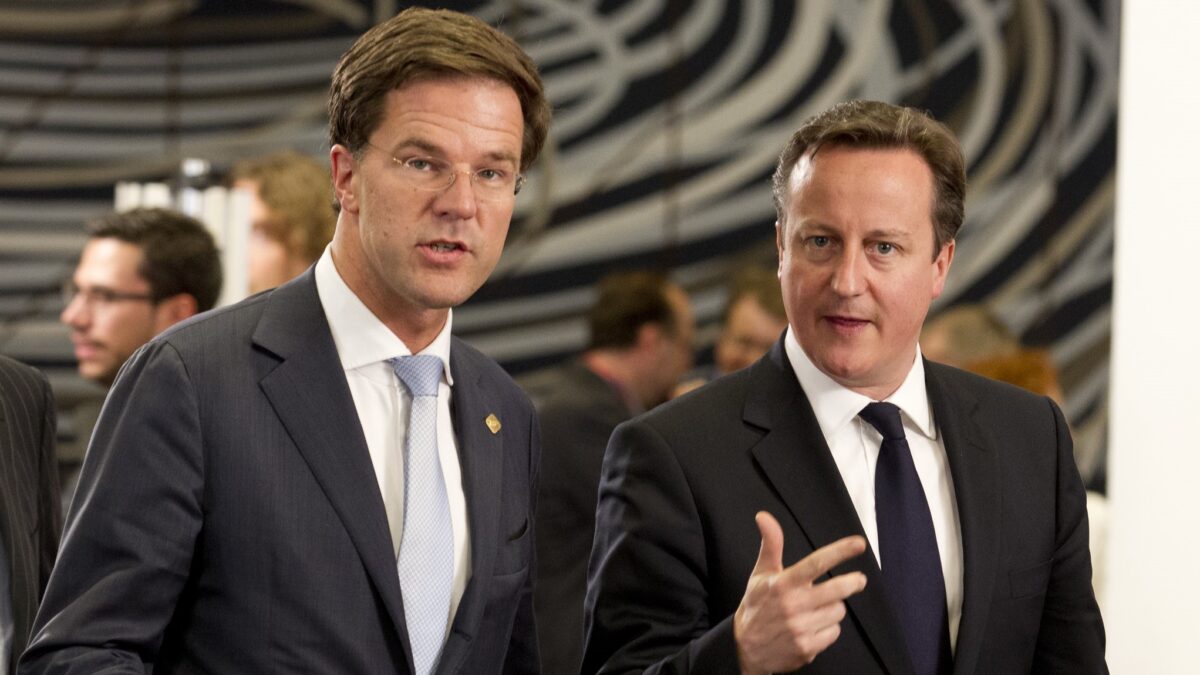In 2010, amidst the financial crisis, two young, centre-right leaders rose to power in the EU’s (then) third and sixth largest economies. Under David Cameron’s leadership, the British Conservative Party had steered towards the political centre, and towards power, parallelling the Dutch VVD’s revival under Mark Rutte.
Moderate conservatism was back. Yet, thirteen years on, their parties, and our nations, diverged drastically. David Cameron’s bet to neutralise the radical-right through the Brexit referendum backfired. He left office, with Mark Rutte not even halfway through his tenure, and the UK departed from the EU.
Since then, the Conservative Party has been increasingly blurring the lines with the radical-right. The shift is evident in their embrace of a hard Brexit, Boris Johnson’s flouting of liberal democratic norms, Liz Truss’ disastrous economic policies, and Rishi Sunak’s controversial plan to deport asylum seekers to Rwanda.
New studies in political science reveal that when mainstream parties copy far-right strategies, it does not only fail to benefit themselves but may inadvertently strengthen their opponents. While some Tories may have thought they were controlling populism, they failed to see that, in fact, it was populism that was consuming them.
The Netherlands charted a different course, and showed what the United Kingdom under a ‘Remain’ vote may have looked like. While the UK cycled through Theresa May, Boris Johnson, and Liz Truss, the Netherlands enjoyed a stable government from 2017 to 2021, which not only retained its majority in the 2021 election but also continued to govern.
While turmoil reigned across the Channel, the Netherlands realised that international politics isn’t like a walking buffet where you just pick what you like. It bid farewell to its euroscepticism and came to recognize the European Union (EU) as both important and beneficial. The coalition agreement of 2021 even aspired for the Netherlands to ‘take a leading role’ within the EU. My six years of studying politics in the UK led me to a deeper appreciation of my home government’s earnestness, focus, and seriousness.
When Mark Rutte tweeted ‘Welcome back!’ in response to Cameron becoming the new Foreign Secretary, it echoed less of congratulations and more of a veiled self-praise. His message seemed to quietly revel in his own longevity, in stark contrast to Cameron, who had left amidst the chaotic throes of Brexit seven years ago.
But as Cameron gears up for his comeback, Mark Rutte is setting the stage for his departure, having announced his exit from national politics this summer. Stepping into his shoes as party leader, Dilan Yesilgöz is drawing inspiration from a familiar playbook – that of the British Conservatives. Yesilgöz has positioned herself as a staunch immigration hardliner, firmly conveying her unwillingness to entertain any half-hearted compromises.
In its recent manifesto, the VVD outlines 25 measures aimed at discouraging asylum-seekers. These measures range from intrusive phone examinations to the introduction of temporary asylum permits, requiring rigorous re-evaluations every three years, and a move towards (even) more austere shelter. This strategy mimics Theresa May’s ‘hostile environment’ policy from 2012, but it’s now being applied more widely to all asylum-seekers in the Netherlands.
Meanwhile, Yesilgöz has stepped away from Mark Rutte’s firm rejection of any alliance with Geert Wilders and the extreme-right PVV. Rutte, in a 2017 letter, had disclosed his reasons, emphasising Wilders’ continuous derision of marginalised groups, disregard for the rule of law, and his reluctance to engage in serious politics. Wilders has not changed, but the VVD has.
Additionally, the revamped VVD agenda proposes stopping all development aid, around five billion euros, barring emergency aid. This ‘Netherlands First’ approach marks a stark contrast to the conservative values upheld by not only Rutte but also David Cameron, who notably doubled aid during his tenure despite widespread austerity measures. If Suella Braverman finds herself seeking new opportunities, Dilan Yesilgöz’s reformed VVD would likely extend a warm welcome.
The Netherlands stands at a critical juncture one day before its general election. Yesilgöz remains a strong contender for the position of the next prime minister. Will the Dutch continue to champion openness and forward-thinking policies, or begin to mirror the UK’s troubling journey?

